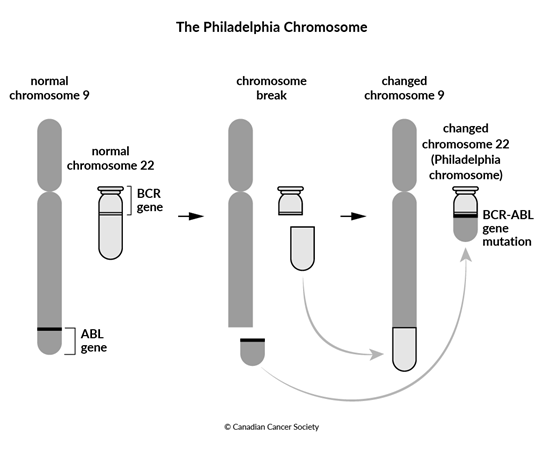What is chronic myeloid leukemia?
Leukemia is a cancer that starts in blood-forming cells (called blood stem cells) in the bone marrow. There are many different types of leukemia. They are grouped based on the type of blood stem cell they start in and how quickly they develop.
Blood stem cells develop into either myeloid or lymphoid stem cells. These stem cells then develop into blast cells. Blast cells from the myeloid stem cells go on to become red blood cells, platelets or granulocytes (a type of white blood cell).
In chronic myeloid leukemia (CML), the bone marrow makes too many granulocytes. This happens because of a genetic change (mutation) called the BCR-ABL gene. The mutation changes the cells so they don't become normal granulocytes. These abnormal granulocytes with the BCR-ABL gene may be called leukemia cells or CML cells. As the disease progresses, the CML cells build up in the bone marrow and the blood. As more and more cells collect, they crowd out the healthy blood cells so they can't do their jobs.
CML develops very slowly, which is why it is called a chronic disease.
Genetic changes with CML
A specific genetic change to chromosomes causes CML. This is an acquired chromosomal abnormality, which means it occurs sometime after birth.
The BCR-ABL gene is made when the ABL gene breaks away from chromosome 9 and attaches to the BCR gene on chromosome 22. The BCR-ABL gene signals myeloid stem cells to become granulocytes. These granulocytes have the BCR-ABL gene, which makes them CML cells. The healthcare team uses the presence of the BCR-ABL gene in cells to confirm a diagnosis of CML.
The BCR-ABL gene sits on chromosome 22. When chromosome 22 has this mutation, it is called the Philadelphia (Ph) chromosome.
The Ph chromosome is present in everyone with CML, but in rare cases it can't be found during testing. When it is found, the disease is described as Ph-positive (Ph+) CML. If the Ph chromosome can't be found, it is called Ph-negative (Ph–) CML.

Over time, genetic changes other than the BCR-ABL gene can occur. These mutations stop myeloid blast cells from developing. As a result, these blast cells first build up in the bone marrow. Eventually they appear and collect in the blood as well. When this happens, it is called a blast crisis and means that CML is getting worse.
The blood and bone marrow
Your trusted source for accurate cancer information
With support from readers like you, we can continue to provide the highest quality cancer information for over 100 types of cancer.
We’re here to ensure easy access to accurate cancer information for you and the millions of people who visit this website every year. But we can’t do it alone.
Every donation helps fund reliable cancer information, compassionate support services and the most promising research. Please give today because every contribution counts. Thank you.
